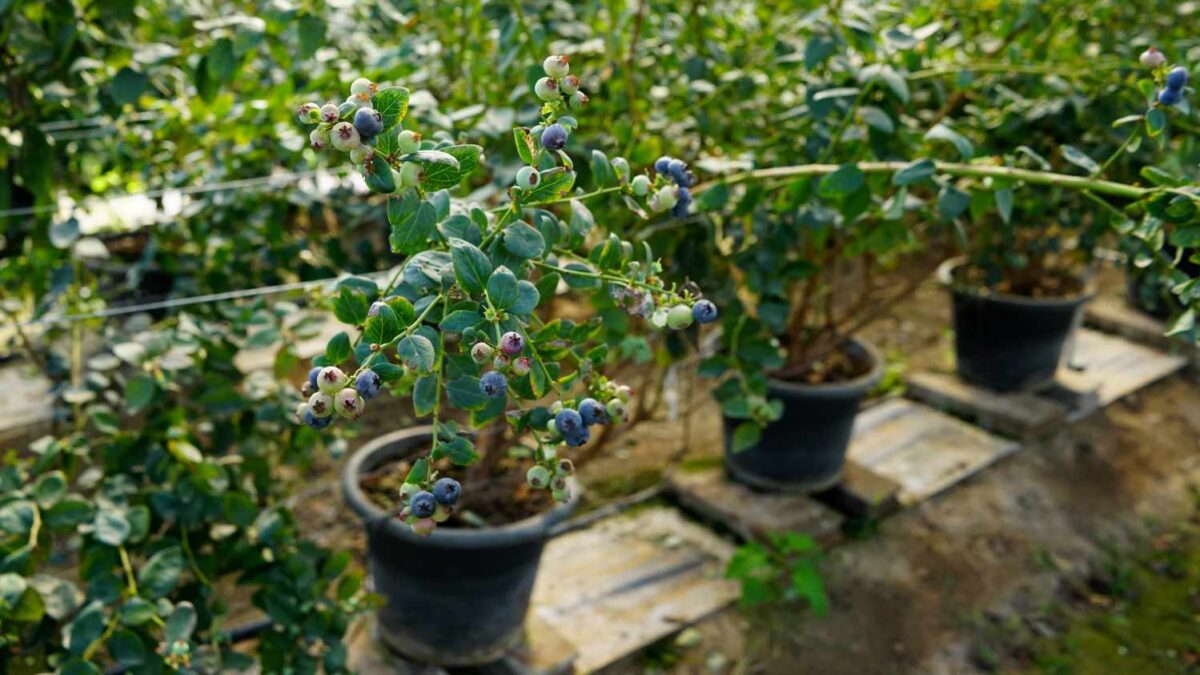Blueberries are a delicious and nutritious fruit that are enjoyed by people all over the world. However, blueberries are also susceptible to a variety of pests, which can damage the plants and reduce the yield of fruit. There are a number of things that can be done to protect blueberries from pests, including:
1. Plant in a sunny location
Blueberries prefer full sun, which helps to deter pests. When choosing a location for your blueberry bushes, make sure that they will receive at least 6 hours of direct sunlight per day.
2. Avoid overwatering
Too much water can make blueberries more susceptible to pests. Blueberries should be watered deeply and infrequently. Allow the soil to dry out slightly between waterings.
3. Fertilize regularly
Fertilize your blueberry bushes with a balanced fertilizer in the spring and fall. This will help to keep them healthy and strong, which can make them more resistant to pests.
4. Inspect your plants regularly
Inspect your blueberry bushes regularly for signs of pests. The sooner you identify a pest problem, the easier it will be to control.
5. Use physical barriers
Physical barriers, such as row covers, can be used to prevent pests from reaching your blueberry bushes. Row covers are lightweight fabric sheets that can be placed over your bushes to create a barrier between the plants and pests.
6. Apply pesticides
If necessary, you can apply pesticides to control pests. However, it is important to use pesticides only as a last resort, as they can harm beneficial insects and wildlife.
Common Blueberry Pests
There are a number of common pests that can attack blueberries, including:
- Aphids
- Ants
- Beetles
- Birds
- Chipmunks
- Earwigs
- Flea beetles
- Leafhoppers
- Mites
- Slugs
- Snails
- Spider mites
- Thrips
- Worms
Preventing Blueberry Pests
The best way to protect blueberries from pests is to prevent them from becoming a problem in the first place. There are a number of things that you can do to prevent blueberry pests, including:

Plant-resistant varieties. There are a number of blueberry varieties that are resistant to certain pests. By planting resistant varieties, you can reduce your risk of a pest infestation.
Plant in a good location. Blueberries should be planted in a sunny location with well-drained soil. This will help to deter pests.
Keep the area around your blueberry plants clean. Remove weeds and debris from around your blueberry plants. This will help to reduce the number of places where pests can hide.
Water your blueberry plants properly. Blueberries should be watered regularly, but not too much. Overwatering can make blueberries more susceptible to pests.
Fertilize your blueberry plants regularly. Fertilize your blueberry plants with a balanced fertilizer will help to keep them healthy and strong, which can make them more resistant to pests.
Inspect your blueberry plants regularly. Inspect your blueberry plants regularly for signs of pests. The sooner you identify a pest problem, the easier it will be to control.
Controlling Blueberry Pests. If you do find pests on your blueberry plants, there are a number of things that you can do to control them, including:
Handpicking. For small infestations, you can handpick the pests off of your blueberry plants.
Spraying with water. A strong stream of water can knock pests off of your blueberry plants.
Using insecticidal soap. Insecticidal soap can be used to kill pests on blueberry plants.
Using neem oil. Neem oil is a natural pesticide that can be used to control pests on blueberry plants.
Applying pesticides. If necessary, you can apply pesticides to control pests. However, it is important to use pesticides only as a last resort, as they can harm beneficial insects and wildlife.
By following these tips, you can help to protect your blueberry plants from pests and enjoy a bountiful harvest of delicious blueberries.

